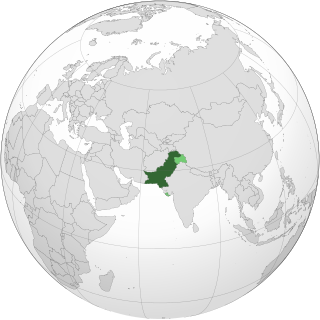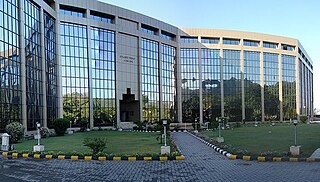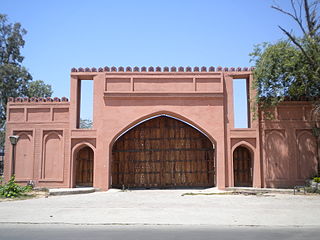
The United States Institute of Peace (USIP) is an American federal institution tasked with promoting conflict resolution and prevention worldwide. It provides research, analysis, and training to individuals in diplomacy, mediation, and other peace-building measures.

Pakistan is one of nine states that possess nuclear weapons. Pakistan began developing nuclear weapons in January 1972 under Prime Minister Zulfikar Ali Bhutto, who delegated the program to the Chairman of the Pakistan Atomic Energy Commission (PAEC) Munir Ahmad Khan with a commitment to having the device ready by the end of 1976. Since PAEC, which consisted of over twenty laboratories and projects under reactor physicist Munir Ahmad Khan, was falling behind schedule and having considerable difficulty producing fissile material, Abdul Qadeer Khan, a metallurgist working on centrifuge enrichment for Urenco, joined the program at the behest of the Bhutto administration by the end of 1974. Producing fissile material was pivotal to the Kahuta Project's success and thus to Pakistan obtaining the capability to detonate a nuclear weapon by the end of 1984.

Bahria University is a public-sector university established in 2000 by the Pakistan Navy at Shangrilla Road, Sector E-8/1 in Islamabad, Pakistan. The university maintains campuses in Karachi, Islamabad and Lahore.

The Islamabad Policy Research Institute (IPRI) based in Pakistan, was established in 1999. It is affiliated with the National Security Division (NSD) of the government of Pakistan. IPRI focuses on datafication, digitalization, and analysis of information relevant to policy decisions. As a result of recent reforms, IPRI is ranked 74th in the University of Pennsylvania's Think Tanks and Civil Societies Program.
The Institute conducts multi-disciplinary research and promotes civil society-governmental interactions and policy dialogue through national, regional, and international conferences, enhancing the country's research capacity and environment by facilitating issue-centric discourse.
IPRI's publications claims to offer current and high-quality research. It disseminates its findings and policy recommendations through its publications. To foster goodwill and North-South and South-South communication of cultures and ideas, IPRI also supports academic exchange programs between regional and international researchers and think tanks.
IPRI claims to deal with all facets of National Security, including International Relations & International Law, Strategic Studies, Governance & Public Policy, and Economic Security.
IPRI claims to have exemplified around two decades of analysis towards crucial strategic agendas and inter-governmental processes for the Pakistan government.

The National University of Modern Languages (NUMLs) (Urdu: قومی جامعہ جدید زبانیں) is a multi-campus public university with its main campus located in Islamabad, Pakistan and other campuses in different cities of Pakistan.
The Chashma Nuclear Power Plant is a large commercial nuclear power plant located at Chashma in Mianwali, Punjab, Pakistan.
In Pakistan, nuclear power is provided by six commercial nuclear power plants with a net capacity of 3,262 megawatts (3.262 GW) from pressurized water reactors. In 2020, Pakistan's nuclear power plants produced a total of 133 terawatt-hours of electricity, which accounted for roughly 10% of the nation's total electric energy generation.
Pervaiz Iqbal Cheema was a Pakistani political scientist, cricketer, and a professor of International Relations and was last working as Dean, Faculty of Contemporary Studies, National Defence University, Islamabad - Pakistan.

Heritage Museum, also known as Lok Virsa Museum, is a museum administered and managed by Lok Virsa - National Institute of Folk & Traditional Heritage.
The Planning Commission is a financial and public policy development institution of the Government of Pakistan. The Commission comes under Ministry of Planning Development & Special Initiatives The Planning Commission undertakes research studies and state policy development initiatives for the growth of national economy and the expansion of the public and state infrastructure of the country in tandem with the Ministry of Finance (MoF).

The Federal Investigation Agency is a border control, criminal investigation, counter-intelligence and security agency under the control of the Interior Secretary of Pakistan, tasked with investigative jurisdiction on undertaking operations against terrorism, espionage, federal crimes, smuggling as well as infringement and other specific crimes.
The ABA Rule of Law Initiative was established in 2007 by the American Bar Association to consolidate its five overseas rule of law programs, including the Central European and Eurasian Law Initiative, which was created in 1990 after the fall of the Berlin Wall. Today, the ABA Rule of Law Initiative implements legal reform programs in 50 countries in Africa, Asia, Europe and Eurasia, Latin America and the Caribbean, and the Middle East and North Africa.
Kosovar civil society has had many incarnations since the early 1990s. It is a product of the occupation of the Kosovo province by the Socialist Federal Republic of Yugoslavia through 1999, then expanded when the Republic of Kosovo was under UNMIK and KFOR control, and now how it has evolved since the unilateral declaration of independence on February 17, 2008. It consists of the former civil society organizations from before the 1999 conflict, the local NGOs that came about post conflict, and the international NGOs that have either dispersed money or opened local branches within Kosovo.
The Kyber Pakhtunkhwa Judicial Academy is an institution of higher learning in Peshawar, Pakistan which focuses on legal and judicial studies. Its mission is "to change the attitude of young law graduates as judges and to inculcate in them patience, sobriety, confidence, discipline and skill of high quality legal reasoning; to develop their capacity; to enable them to create harmony among all justice sector institutions; to sensitize them to the rights of all litigant public, notably, of the vulnerable communities; and to make them leaders to contribute to the rule of law.

The Islamabad–Rawalpindi metropolitan area is the fourth-largest metropolitan area of Pakistan, after Karachi, Lahore, and Faisalabad. It consists of the twin cities of Islamabad and Rawalpindi.
Access to justice is a basic principle in rule of law which describes how citizens should have equal access to the justice system and/or other justice services so that they can effectively resolve their justice problems. Without access to justice, people are not able to fully exercise their rights, challenge discrimination, or hold decision-makers accountable for their actions.

Zafarullah Khan is a Pakistani Politician, Barrister-at-Law and Writer/Author. He served as Special Assistant to the Prime Minister on Law/Federal Minister, Government of Pakistan (2016-2018); Special Assistant to the Prime Minister on Human Rights, Minister of State, Government of Pakistan (2014–15); Special Assistant to the Prime Minister on Economic Affairs/ Minister of State Government of Pakistan (2014–15); Special Assistant to the Prime Minister on Cabinet Division/ Minister of State Government of Pakistan (2014–15); Special Assistant to the Prime Minister on Parliamentary Affairs/Minister of State Government of Pakistan (2014); Secretary, Law, Justice and Human Rights, Government of Pakistan. He Joined District Management Group of Civil Service of Pakistan (1987); served in the provinces of Punjab and Sindh in various Administrative, judicial and local Government positions from 1989 to 1995 and from 1998 to 2002.

Khawar Mumtaz is a Pakistani women's rights activist, feminist author and university professor. She is the Former Chairperson of the National Commission on the Status of Women (NCSW) who served for three consecutive terms from 2013 to 2019.
Ahmer Bilal Soofi is a Pakistani lawyer and former caretaker minister. He was the Minister of Law, Justice, Parliamentary Affairs and Human Rights in Khoso caretaker ministry in 2013.
The Pakistan Institute of Peace Studies (PIPS) is a non-governmental organization based in Islamabad, Pakistan, dedicated to promoting peace and tolerance in the country. The organization was founded in 2006 and has since then been involved in various research and advocacy activities related to peacebuilding, conflict resolution, and counter-extremism.











